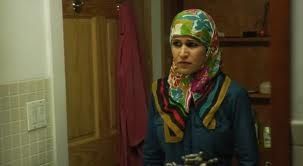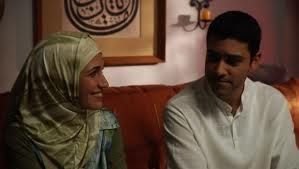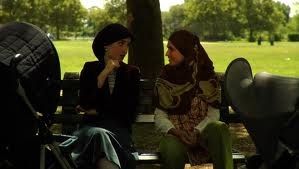
Rochel's father: "This if gonna be one of the most exciting times in you life. I promise you. The memories of that time, they fill me with joy...What a gift. What a gift...I remember walking up the steps in that apartment in Lee Avenue. I remember the way it smelled. The light. I remember the color of the hallway. I remember before I knocked on that old green door..Before I knocked on the door, I had this -I had this feeling. I had this indescribably feeling -I did. And when your mother opened the door, I knew. What a gift."
Arranged is probably one of my favorite movies. It's a movie about tolerance and intolerance. It explores the idea that people can be different (have difference backgrounds, different religions), and still be friends, if they choose to accept that it's okay to be different. We also get an inside peek at two different cultures, as we see what it's like for Rochel living in an Orthodox Jewish community, and Nasira living within her Muslim culture.
At the heart of the movie are two young women: Rochel Meshenberg, 22, an Orthodox Jewish girl, the oldest of four children, living in Ditmasand (a Jewish community in New York), and Nasira Khaldi, a Muslim girl born in Syria, the youngest of three children, whose family moved to New York when she was five (her father was a Hafiz, "a scholar of the Koran", and now owns a gas station). Nasira is a sweet, smart girl with a good sense of humor. Rochel is a bit more shy, but also kind and intelligent. Both young women are working at an inner city New York school, Nasira teaching fourth grade and Rochel assisting a blind student. Both have reached the age of marriage as determined by their cultures, in which arranged marriages are the custom, and their families are seeking husbands for them.
The issue of choice is a major theme throughout the movie. Rochel helps to demonstrate to the students in Nasira's class that you get to choose who to be friends with. Nasira's students assume that the two teachers cannot be friends because of the conflicts between their respective religions:
Student: Jimmy was saying that you and Miss Rachel can't be friends because you're from different religions. Like, you hate each other or something.
Jimmy: 'Cause I heard that the Muslims want to kill all the Jews.
Nasira: Do you think I want to kill you, Miss Rochel?
Student: I hear that, too -that the Muslims wanted to push Israel back into the ocean.
Nasira: There are always people who hate other people. And it's out of ignorance. It's because they feel scared or they feel threatened or maybe they just don't understand where the other people are coming from.
Student: So how many of them want to kill Jews, then?
Rochel explains that they can decide to be friends regardless of their religious backgrounds, and to illustrate her point, plans a unity circle exercise (which the principal seems to think is a waste of time -because they have important things to learn than tolerance, apparently), the point of which is: "We choose who are friends are, right? Who we want in our circles. Just like last class, when you thought it was impossible that Miss Nasira and I could be friends because she's Muslim and I'm Jewish. We all have our -our traits, our characteristics, our words on our chests, right? It comes down to a choice, an individual choice about who we spend our time with and how we choose to communicate."
 |
| Miss Jacoby, the school principal. |
Nasira: You know, I've been thinking about that little lecture Miss Jacoby gave us.
Rochel: Yeah. Yeah, me too.
Nasira: It just -it wasn't right. It was totally ignorant. It was -it was arrogant. It...I mean, who does she think she is?
Rochel: Yeah, you'd think she'd be more considerate given her position.
Nasira: Right?
Rochel: Yeah.
Nasira: You know, we could probably sure her, retire at 25. Do you want to?
Later at the playground, when Nasira and Rochel are laughing together, the principal butts in, saying, "I thought your religions didn't allow you to enjoy life. I'm kidding. I'm really glad you two became such good friends. So, how's the love lives? Any bulletins? Any hot prospects?" Nasira retorts casually, "No, no. Nothing to report. I'm sorry. We're actually forbidden to think about men unless they ride in on horseback and sweep us off our feet and steal us from our father-dominated homes." Nasira consistently maintans a humorous attitude about the whole thing, though she definitely recognizes that she is being treated inappropriately.

The young women bond over the prejudicial treatment they receive from the principal, and over their simultaneous journeys through the matchmaking process. They learn about each others customs, discussing how many children they want and whether their cultures allow birth control. Nasira even applies henna to Rochel's hands. Their friendship does not sit well with everybody. When Nasira visits Rochel at her home to get some work done, Rochel observes, "Neighbors might, uh, give us strange looks, but why not, right?" Rochel's mother is visibly upset to find Nasira in their house, and goes so far as to have Rochel ask her to leave:
Mother [Taking Rochel to the other room]: You should have asked your father first.
Rochel: Why?
Mother: Why?! There could be repercussions. Neighbors might see.
Rochel: They neighbors are busybodies.
Mother: Exactly. Exactly my point.
Rochel: We work together. And she's a friend from school. That's it.
Mother: All right. Fine. Fine. Then I think you should ask her leave and talk to your father before she comes back.
Rochel: What do you -
Mother: I didn't want to mention this, but this could hurt your prospects.
Rochel: That's ridiculous.
Mother: Perhaps it is, but it could. I'm sorry. Talk to your father.
Nasira [When Rochel returns to the room]: She doesn't feel comfortable with me being here, right?
Rochel: Yeah.
Nasira: Should we should have a unity circle in the kitchen?
Rochel: I'm sorry. I'm so embarrassed.
Nasira: Don't be. I'll see you tomorrow.
Thankfully, Nasira is understanding and has a sense of humor about it, though I'm sure it must be hurtful, and she doesn't hold it against Rochel in any way. Rochel's younger brother is also a bit prejudiced, which he likely gets from his mother. When Rochel takes him to the park, they bump into Nasira, who is there with her nephew, and he asks Nasira if she's Jewish. When Rochel tells him she's not, he stares at Nasira suspiciously. When encouraged to play with Nasira's nephew, he asks, "Is HE Jewish?" "No, but it doesn't matter, Avi, okay?" Rochel answers, and they run off to play. Nasira takes it in stride, quipping, "Someone should be shooting a commercial for world peace." Nasira's parents are more understanding. Her mother is very welcoming when Rochel visits their home, and her father, though he looks surprised at first, is polite.
 |
| Rochel's mother peeks at Rochel's suitor -the date doesn't go well. |
Her conviction unfortunately does nothing to settle the issue. Beginning to doubt that she will be able to find a husband through this process, she refuses to continue for the time being, and this causes increasing friction with her mother, who consistently presses the topic. She is almost vicious in her persistent verbal barrage, pulling out all the stops: "What kind of reputation will this family have after this?...This is not good for your father's health. I don't bring this up to add pressure or guilt, but the doctor says your father's blood pressure is elevated -dangerously elevated...So, what? So your sister pays the price and has her -yes, she has her chances ruined because she has to wait until you're ready? No, no. Two spinsters in this house -absolutely not. Matan, Matan, can you come help me with this, please?...Your daughter. She's being selfish. She's not thinking of her family. She is not considering the bigger picture." Her father seems to be more lenient, but pretty much stays out of it altogether, probably not wanting to cross his domineering wife (so much for the father-dominated home idea).
 Rochel's doubts over her so-far disappointing experience with matchmaking cause her a great deal of mental anguish, as she questions her core beliefs. She even leaves her home to visit a cousin, Leah, who has left the community, and talks to her about her choice to leave. Leah encourages her to get a "different perspective," telling her there are other ways of life. The culture shock is too great for Rochel (Leah really throws her into the deep end of the pool), and she returns home, but remains adamant that she will not marry someone she doesn't like just to please her family. She takes some comfort in visiting her grandmother's grave, with Nasira along for moral support, and asking for guidance ("I do respect God's will, and...and, of course, the wisdom of mother and father. But you also always taught me about trusting my intuition. What do I do about that? How do I listen to that?"), and in being able to vent to Nasira's sympathetic ear:
Rochel's doubts over her so-far disappointing experience with matchmaking cause her a great deal of mental anguish, as she questions her core beliefs. She even leaves her home to visit a cousin, Leah, who has left the community, and talks to her about her choice to leave. Leah encourages her to get a "different perspective," telling her there are other ways of life. The culture shock is too great for Rochel (Leah really throws her into the deep end of the pool), and she returns home, but remains adamant that she will not marry someone she doesn't like just to please her family. She takes some comfort in visiting her grandmother's grave, with Nasira along for moral support, and asking for guidance ("I do respect God's will, and...and, of course, the wisdom of mother and father. But you also always taught me about trusting my intuition. What do I do about that? How do I listen to that?"), and in being able to vent to Nasira's sympathetic ear:Rochel: Do you ever think that, um, maybe it's not going to work out? I mean, your process is different, right? But, you know, what if it doesn't?
Nasira: It'll work.
Rochel: How can you be so sure, though? I mean, what if that moment doesn't happen? My father talks about this indescribable feeling.
Nasira: I mean, it worked for our parents, right? They're happy, right?
Nasira has an easier time finding a husband, after an initial misstep. The first man she is set up with is an old friend of her fathers, and she is horrified. She is so upset that she has to step away from the table to take a breather in another room. Her mother follows her:
Mother: I know, okay? I understand.
Nasira: There's no way, Mom. There's no way.
Mother: Okay. He's a family friend of your father's. You just have to be respectful, let this play out.
Nasira: Okay. Respectful, yes, but there will be no playing out. How could he think this is a real possibility?
Mother: I don't know. We will talk to him. Come on.
Nasira: This is not a good beginning.
Mother: I know.
 |
| Nasira steps away during a bad set-up. |
Nasira: It sounds like a better way of doing it.
Rochel: I don't know. It hasn't worked out so well yet. The Shadchan -that's what she's called. She's supposed to really know you, find who's most compatible.
Nasira: Which is better than your father.
Rochel: Ah, I guess we'll see.
Nasira: Plus, you get to go on actual dates and see what it's like, you know, without your family there breathing down your neck.
Nasira's parents support her feelings, however:
 Father: Yes, Nasira?
Father: Yes, Nasira?Nasira: Did you talk to mom?
Father: Yes.
Nasira: So?
Father: You have to be willing to look past only the physical, Nasira. There may be virtue behind bad teeth, thinner hair, a thick waistline.
Nasira: It's not only that, Baba. It -we have nothing in common. He -he's never really lived here. Here's 20 years older than I am. I -I...what?
Father: I am not interested in a battle with you and your mother, believe me. I simply want the best for you. I want you to have a loving home, children. I want you to experience everything that you have in this house. Do you find the union between your mother and me as successful?
Nasira: Yes, I do.
Father: Okay. I want the same for you.
Nasira: So does that mean that he's not the...
Father: He's going back to Syria on Tuesday. And not with my youngest, most precious daughter.
The next suitor is instantly appealing to her. He is a young, successful college student, attractive and friendly. At school, she encourages Rochel, telling her about her own positive experience:
Rochel: I don't know, I just don't think I can do it anymore.
Nasira: Something will work out. God will show a way. We both still believe that, right? It, um...Well, I think there's a possibility with the one I just met.
Rochel: What?
Nasira: I don't know. I was there late. It could have been a total disaster, but, um, but I think there's something there. I'm not totally sure.
Rochel: Oh, my gosh. I totally forgot to ask. What was he like?

Nasira is attracted to him, and he to her. She tells Rochel that when she and the young man, Jamil, brushed arms, "It was like an electric shock went up my arm and then straight down my spine. It was so intense." After not much longer, they are engaged, to the happiness of all involved.
Rochel is finally taken to see a holy woman who performs some kind of ceremony that is is supposed to help her find her match. She gives Rochel a bracelet to wear, and it is this bracelet that finally leads to Rochel confronting the principal at the school. The principal notices the religious bracelet Rochel is wearing, and brings it up: "I know what it is, Rochel. My great-grandmother used to do stuff like that when she lived in the ghetto in Eastern Europe. Come on, Rochel. You're more sophisticated than that. The evil eye?...That's the kind of superstitious nonsense we try not to teach in this school. I mean it's -it's so in the past." Rochel stands her ground:
Rochel: The past?...Why does, um, traditional have to equal nonsense to you? I mean, how is this any less valid or -or meaningful than all the other teachers reading their horoscopes every day at lunch?
Principal: Oh, please, they do it for fun. They don't believe it for one second.
Rochel: Yes, they do. Yes they do. And, you know, why is, um, getting drunk and -and sleeping with some guy you don't even know a better way of finding love? I mean, how is that more liberated than how we do it?
Principal: You know I am not talking about that. You know I am talking about having a choice in life -
Rochel: I have a choice!
Principal: A choice in career, a choice in who you love!
Rochel: I have a choice! A community has a choice! It's different, yes, but I have a say!
 |
| Nasira sneaking a picture of Gideon. |
When Rochel finally concedes to her mother's pleas to meet with the Shadchan again, she is presented with Gideon's file: "I'm in the process of updating my system to include photographs (Nasira contributing to the matchmaking business at large -clever gal.). Sometimes this helps. If you just despise the way someone looks, you can't imagine sitting through even one date looking at this person, then that's that...It's a strange story how this boy ended up in my book. Last week, a Sephardic woman comes to my door...and she just hands me this information. Strange woman. Anyway, he's an interesting possibility." Rochel smiles, saying "Yes," as she recognizes him. This is the first time she has shown any interest in one of the boys. The matchmaker looks surprised, and her mother and aunt hold hands with renewed hope. "I mean, I like this new system -to be able to see, uh, who they are a little more. It's nice...I just think he has a nice face. A kind face, right?" The three women look startled but overjoyed to see Rochel's smiling enthusiasm. Rochel's date with Gideon goes wonderfully. They hit it off right away, and she finally figures out that it was Nasira that arranged the whole thing to help her. Gideon tells her, "Honestly, this is the first time that I've been out with someone and not felt all nervous and awkward." "Yeah, me too," Rochel replies happily. They are quickly engaged.

The movie ends with Rochel and Nasira still close friends. They are married, happy, and both have had a baby girl. They are sitting together on a park bench, chatting and laughing.
It's a really charming movie that looks at prejudice, intolerance, and religious differences in a way that still manages to be entertaining and enjoyable. Movies dealing with tough subjects don't always have to be depressing and unhappy (like Crash). Sometimes a movie can explore complicated ideas and still have a nice, positive message. It can show prejudice, and it can show people rising above prejudice. I love it.
No comments:
Post a Comment